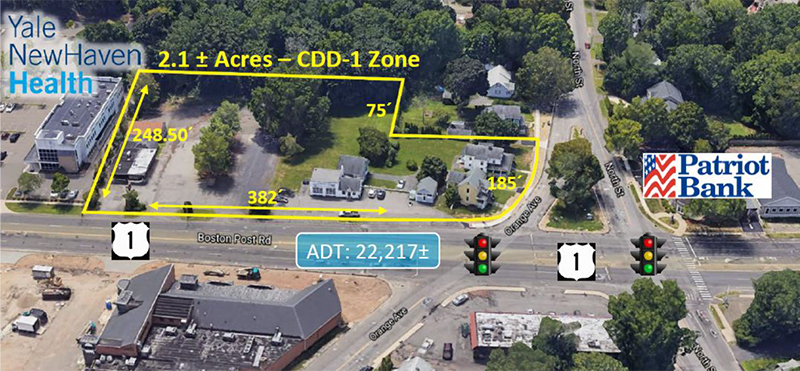O,R&L arranges $1.85 million sale
of a 2.1-acre redevelopment site

Milford, CT O,R&L Commercial has completed the sale of a 2.1-acre redevelopment site located at 801 Boston Post Rd. After several years on the market and numerous offers, the development site has officially sold for $1.85 million.
This sale marks a significant milestone for the family owners of the property who have owned the parcel for decades, growing up there, and seeing it through its various stages. Over the years, the property was home to Paul’s Restaurant, built in 1946, and famous for its hamburgers, cheeseburgers, fries and onion rings – beloved by the community for 62 years before closing its doors in 2008.
The other structures on the parcel included a few small commercial buildings and two residential family homes.
801 Boston Post Rd. sits on one of Milford’s most visible and heavily trafficked corridors (Rte. 1) and has long been viewed as a prime redevelopment opportunity. Interest in the site remained strong over the years, attracting a diverse pool of potential buyers and developers from across the region. Strategically located just minutes from I-95, the property is positioned in a highly desirable commercial zone surrounded by national retailers, many shops and restaurants and a growing residential base. It is directly adjacent to a Yale New Haven Health Medical Office Building and Urgent Care Center.
Toby Brimberg of O,R&L Commercial in Branford represented the sellers, Villani Associates, LLC. The buyer, Metro Star Properties is a local developer with a strong reputation and track record for building both residential and commercial projects within the state. Metro Star’s plans for this property will be announced in the future.
Atlantic Property Management expands facilities maintenance platform: Assigned two new facility management contracts in RI


Tenant Estoppel certificates: Navigating risks, responses and leverage - by Laura Kaplan

New Quonset pier supports small businesses and economic growth - by Steven J. King

Connecticut’s Transfer Act will expire in 2026. What should property owners do now? - by Samuel Haydock


 (1).png)







 (1).png)
